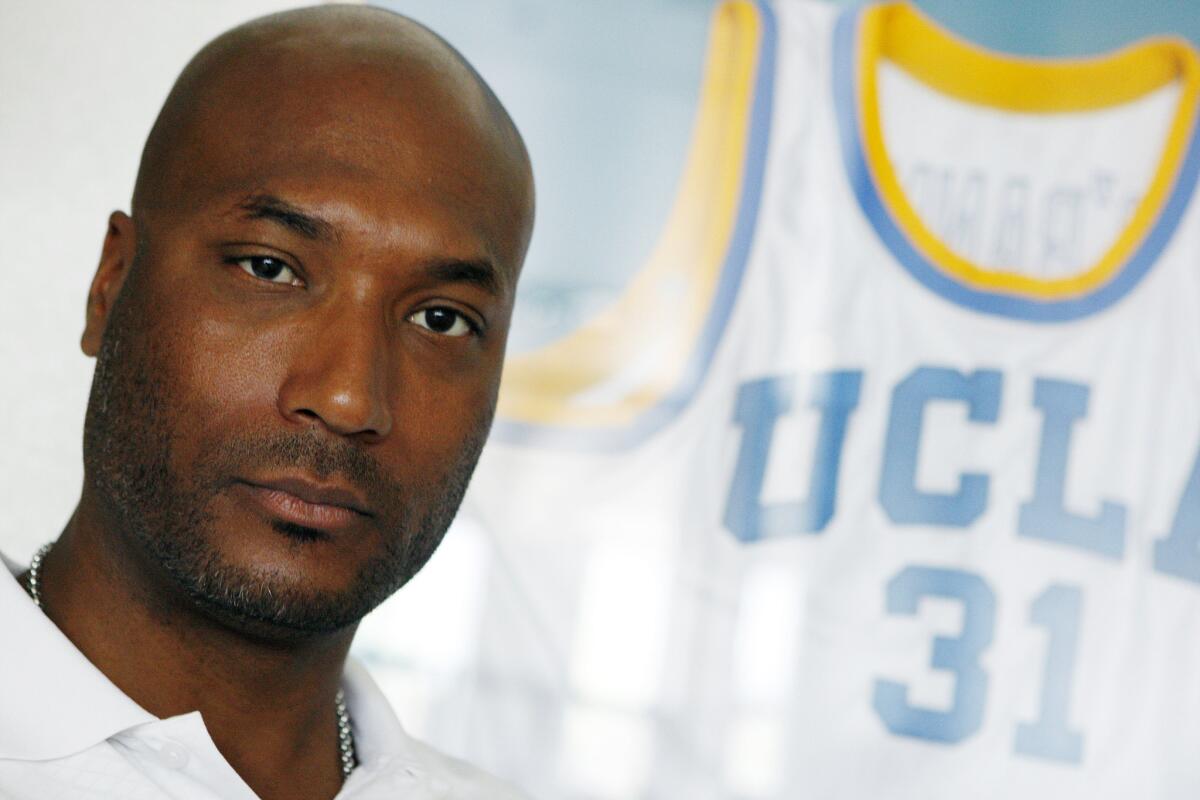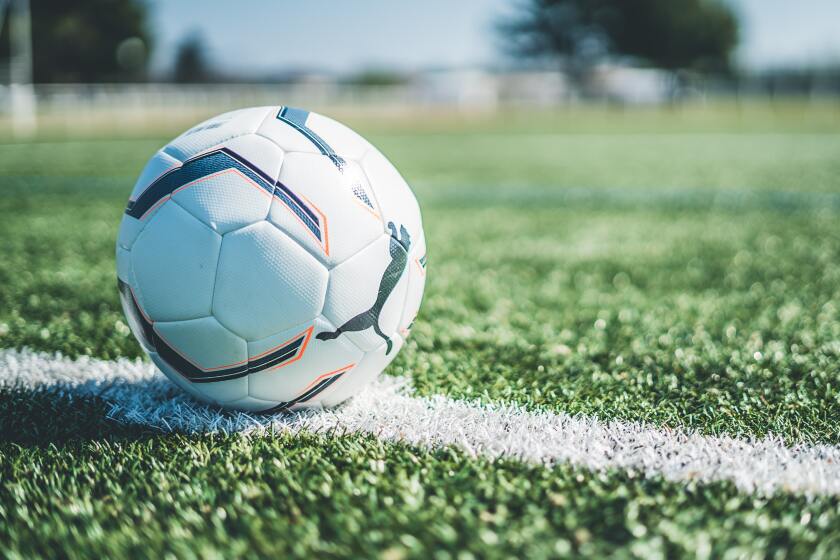Ed O’Bannon testifies in lawsuit against NCAA

- Share via
Reporting from Oakland — A civil trial pitting a class of former and current student athletes against the NCAA got underway Monday in U.S. District Court in a case that could upend the broad notion of amateurism in the multibillion-dollar collegiate men’s basketball and football industry.
Lead plaintiff Ed O’Bannon, a star UCLA basketball player in the 1990s, took the stand first in the non-jury trial, which seeks an injunction to stop the National Collegiate Athletic Assn. from denying athletes the ability to profit from the use of their names, images and likenesses in television broadcasts, rebroadcasts, video games and DVDs.
On direct examination by plaintiffs’ attorney Michael Hausfeld, O’Bannon, now a 41-year-old automobile sales and marketing employee in Las Vegas, relayed his experience at UCLA as one solely dedicated to basketball, with academics as an afterthought that had to be sandwiched in to accommodate a rigorous sports schedule.
Speaking calmly and slowly and cracking the occasional joke, O’Bannon said he spent 40 to 45 hours a week on basketball during the playing season and a little over half that the rest of the year. He said he chose a major that would fit with his schedule and, along with other players, was compelled to take senior finals in a hotel ballroom during the Final Four.
O’Bannon also said that as a 17-year-old recruit he signed documents without reading them -- including a waiver that allegedly gave the NCAA the right to use his likeness -- because if he hadn’t, he wouldn’t have been able to play.
“While you were at UCLA, did you consider yourself a student who just happened to be an athlete?” Hausfeld asked.
O’Bannon: “Nah. I was an athlete masquerading as a student. ... I was there strictly to play basketball. I was an athlete and I did basically the minimum to make sure that I kept my eligibility academically so I could continue to play.”
O’Bannon relayed how, in 2008, he was at a friend’s house when his friend’s son showed him a video game produced by Electronic Arts that included his likeness -- a UCLA player with his jersey number (31) who shot with his left hand, was “bald-headed” and shared the same complexion as O’Bannon. The lawsuit stemmed from that realization.
A related case against Electronic Arts recently resulted in a damage settlement on the video issue, but Monday’s trial is moving forward on the broader issues, which include the extremely lucrative broadcast market.
O’Bannon and the class represented by the lawsuit are contending that the NCAA’s use of student athlete names and likenesses is a violation of antitrust law in that it constitutes a “price-fixing conspiracy” and a group boycott by NCAA participants that distorts the market.
In his cross-examination of O’Bannon, Glenn Pomerantz, the NCAA’s chief outside counsel, stressed the amateur nature of student athletics by focusing on the overall college experience of mentorship and community and the direct benefits of scholarship: tuition, room and board -- including access to a buffet “training table” shared with the football players -- and free books.
O’Bannon chose to stay with the Bruins in 1995 -- though he could have gone to the NBA -- and helped the team win the NCAA championship. He was named the game’s most valuable player.
“Is it fair to say that season changed your life?” Pomerantz asked.
“Yeah, I think it is,” O’Bannon answered.
Asked if he knew whether proceeds from broadcast contracts were used to pay for student athlete benefits such as scholarships and books, O’Bannon said he did not know.
Though he acknowledged that he had said in a 2011 deposition that current student athletes are amateurs, he said he now feels differently.
“I think they should be paid,” he said on the stand. “I’m not talking, you know ... x certain amount. That’s for someone else to figure out. But with the amount of money that they are bringing in, I think that they should be compensated.”
O’Bannon did concede on cross-examination that after he stopped playing for the Bruins he was able to enter into an endorsement deal with Nike and license his likeness for trading cards -- with no opposition from the NCAA or UCLA.
Stanford University economist Roger Noll was the second witness, speaking about what he described as the anti-competitive nature of the financial arrangement.
“It would not be possible to pay these student athletes zero if there was a competitive atmosphere because they could go somewhere else,” he said.
The case is just one of a number of current challenges to the amateur conceit of collegiate athletics, including a unionization effort at Northwestern University and another lawsuit that seeks to overhaul the scholarship model by turning players into salaried employees in a free-market system.
The trial here is expected to last as long as three weeks but U.S. District Judge Claudia Wilken will not rule from the bench. Whatever the outcome, the case is likely to be appealed, possibly all the way to the U.S. Supreme Court.
More to Read
Go beyond the scoreboard
Get the latest on L.A.'s teams in the daily Sports Report newsletter.
You may occasionally receive promotional content from the Los Angeles Times.











